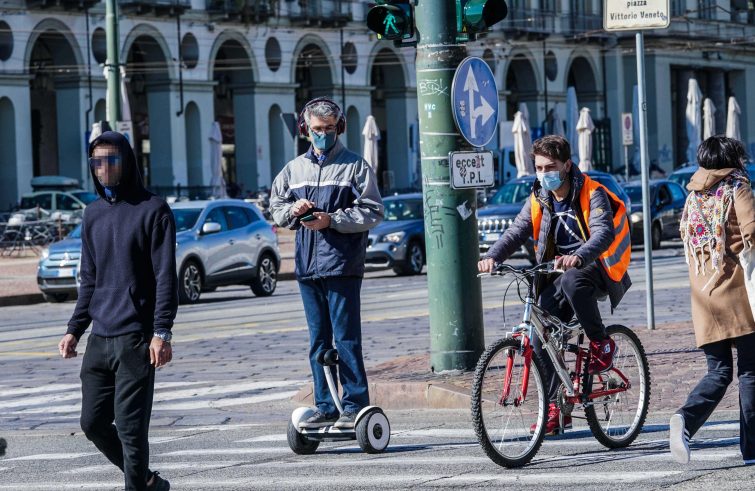
“In addition to increasing total numbers of cases, the share of tests returning a positive result is now 5.4%, marking a sharp rise compared to last week, when it was below 5%. Considering that between the end of June and July it ranged between 0.5 and 0.7%, it becomes clear that the government was bound to implement further measures to avoid a quick rebound, not a second wave, but a recrudescence of Covid-19.”
 Roberto Cauda, Professor of Infectious Diseases at the Catholic University and Director of the Infectious Diseases Ward at Rome’s Policlinico Gemelli, contacted by SIR, commented on the Prime Ministerial Decree signed last night by Giuseppe Conte, effective as of tomorrow, October 14, to November 13.
Roberto Cauda, Professor of Infectious Diseases at the Catholic University and Director of the Infectious Diseases Ward at Rome’s Policlinico Gemelli, contacted by SIR, commented on the Prime Ministerial Decree signed last night by Giuseppe Conte, effective as of tomorrow, October 14, to November 13.
The Prime Ministerial Decree. In short, these are the new measures envisaged: restaurants and cafes will close at 24 hrs, but by 9.00 pm eating and drinking while standing will be banned, as is parking outside restaurants and bars; the mandatory use of masks outdoors is confirmed and recommended also in private homes in the presence of non-residents; soccer and other amateur contact sports are prohibited; no more than one thousand spectators in stadiums, 15% occupancy for indoor stadiums; suspension of all events involving gatherings; prohibition of private parties indoors or outdoors; a maximum of 30 guests for wedding receptions or other ceremonies; companies and businesses are invited to further encourage remote working. Moreover, last night the Minister of Health released a circular letter with new indications on isolation and quarantine that, in a nutshell, reduces the quarantine period with a single negative NT swab to get out of isolation.
“Necessary restrictions”, Cauda said. “In fact – he explained – the virus has never disappeared, even at its lowest recorded level, it was always here. The resurgence of reported cases since mid-August – transmitted to the family mainly by young and asymptomatic travellers returning after vacation – must be closely monitored, albeit without undue insistence. In fact, it is necessary to avoid in every way to repeat what happened in neighbouring countries such as France, Spain and Great Britain – which has adopted much stricter containment measures than those provided for in the new PM Decree.” The expert deems said measures to be
“a good compromise between safety and the need not to overburden the country’s economic system.”
Quarantine and isolation. Commenting on the new regulations, Cauda said: “Based on evidence, the vast majority of cases occur within the first 5-7 days. The initial 14-day isolation period for positive cases was not an arbitrary decision, as it extended by two days the 12-day period in which, in very rare cases, people started showing symptoms. I believe that a negative control swab guarantees health safety, as the risk is significantly reduced.” With regard to asymptomatic cases that continue testing positive between the 10th and 17th day, “isolation can be interrupted on day 21 as its extremely low PCR positivity is considered irrelevant in terms of contagiousness.”
Also these indications, for the expert, represent “a good balance between safety, acceptable isolation requirements and, yet again, efforts to mitigate the impact on the economy as much as possible.”
 Immuni. 8,316,353 downloads; 8,887 notifications sent; 499 positive users. These are the figures of the Immuni App, according to the latest update ( October 13) of the Ministry of Health, which, notwithstanding anti-contagion measures – handwashing, wearing masks and physical distancing – strongly recommends its use. “I downloaded it, and so did my wife,” Cauda said, adding that its diffusion is discouraged by “fears related to privacy as well as a certain degree of ‘laziness’ that leads to postpone its download since there are other priorities, although over the last period, perhaps in connection with the risk of a second potential recrudescence of the virus, downloads have greatly increased.” How can we convince those who are still “reluctant”? “”By explaining that
Immuni. 8,316,353 downloads; 8,887 notifications sent; 499 positive users. These are the figures of the Immuni App, according to the latest update ( October 13) of the Ministry of Health, which, notwithstanding anti-contagion measures – handwashing, wearing masks and physical distancing – strongly recommends its use. “I downloaded it, and so did my wife,” Cauda said, adding that its diffusion is discouraged by “fears related to privacy as well as a certain degree of ‘laziness’ that leads to postpone its download since there are other priorities, although over the last period, perhaps in connection with the risk of a second potential recrudescence of the virus, downloads have greatly increased.” How can we convince those who are still “reluctant”? “”By explaining that
it’s an important tool to track contagions and, combined with high numbers of swab tests – now steadily over 100,000 and likely to increase further once rapid tests are in place – to help contain the spread of the virus.”
“The breakthrough – he observed – will occur once saliva tests are fully validated and approved. At that point, the more tests are carried out, the more the community will be protected. In the meantime, however, Immuni alerts users in full anonymity, and without monitoring or tracking the user’s movements, that may have come into contact with a positive person, with instructions to contact the general practitioner and, if necessary, have a swab test.
We have the positive example of South Korea where the use of the local tracking app considerably reduced the spread of the virus.”












